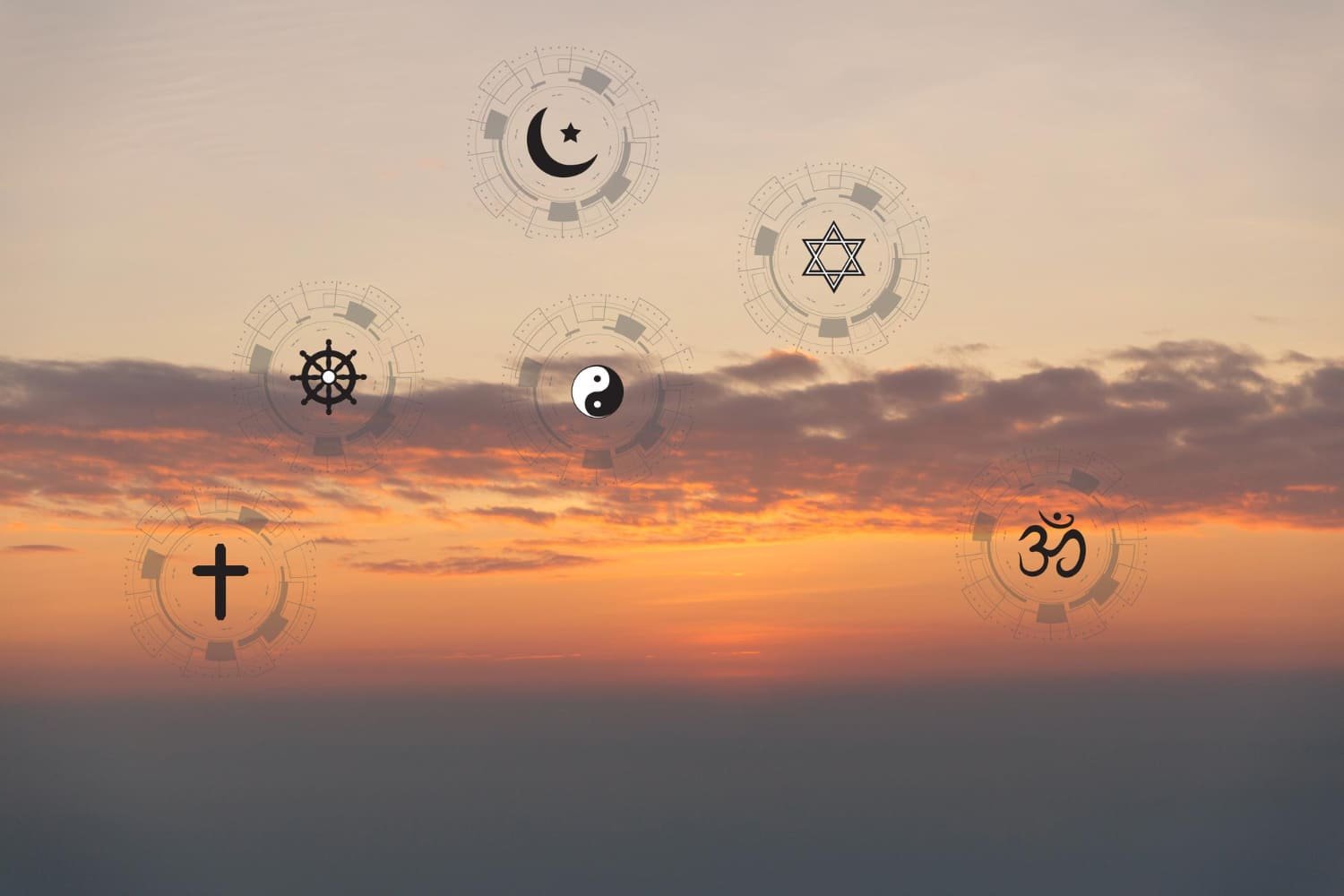Buddhism and atheism are two distinct belief systems that are often compared and contrasted. While they share some similarities, such as the absence of a belief in a personal God, there are also significant differences between the two.
Buddhism is a religion that originated in ancient India and is based on the teachings of the Buddha, while atheism is a philosophical position that denies the existence of any deities.
One of the key differences between Buddhism and atheism is their approach to the concept of the self. Buddhism teaches that the self is an illusion, and that the ultimate goal of spiritual practice is to transcend the self and achieve enlightenment.
Atheism, on the other hand, does not necessarily have a specific view on the self, but generally holds that there is no soul or afterlife, and that consciousness arises from the physical brain.
Another difference between the two belief systems is their approach to morality. Buddhism has a complex moral code that emphasizes compassion, nonviolence, and mindfulness, among other virtues.
Atheism, on the other hand, does not have a specific moral code, but rather encourages individuals to develop their own ethical principles based on reason and empathy.
While both Buddhism and atheism can provide a framework for ethical behavior, their approaches to morality are quite different.
What is Buddhism?
Buddhism is a major world religion that originated in ancient India and is based on the teachings of Siddhartha Gautama, also known as the Buddha. The Buddha taught that the ultimate goal of life is to achieve enlightenment, which is a state of perfect wisdom, compassion, and peace.
Unlike many other religions, Buddhism does not involve belief in a personal god or gods. Instead, the Buddha taught that the universe is governed by natural laws and that suffering arises from our attachment to things that are impermanent and constantly changing.
The Four Noble Truths and the Eightfold Path are the foundational teachings of Buddhism.
The Four Noble Truths are:
- The truth of suffering (dukkha)
- The truth of the cause of suffering (samudaya)
- The truth of the cessation of suffering (nirodha)
- The truth of the path leading to the cessation of suffering (magga)
The Eightfold Path is a set of guidelines for living that includes right understanding, right intention, right speech, right action, right livelihood, right effort, right mindfulness, and right concentration.
By following the Eightfold Path, individuals can achieve enlightenment and end the cycle of rebirth.
What is Atheism?
Atheism is the lack of belief in any deity or supernatural power. It is a philosophical position that asserts that there is no evidence or reason to believe in the existence of God or gods. Atheists believe that the universe and everything in it can be explained through natural processes and scientific inquiry.
Atheism is not a religion or a belief system, but rather a rejection of supernatural claims. It is not a monolithic group, and there are many different types of atheism, such as agnostic atheism, strong atheism, and implicit atheism. Some atheists may also identify as secular humanists, who believe in the importance of reason, ethics, and social justice.
While atheism has existed throughout history, it has gained greater visibility in recent years due to the rise of the “New Atheism” movement, which advocates for a more outspoken and critical approach to religion. Some of the most famous proponents of atheism include Richard Dawkins, Sam Harris, and Christopher Hitchens.
It is important to note that atheism is not synonymous with immorality or nihilism. Many atheists lead fulfilling and meaningful lives based on their own values and principles.
Atheism does not provide a set of rules or commandments to follow, but rather encourages individuals to think critically and make their own decisions based on reason and evidence.
Beliefs and Practices of Buddhism
Buddhism is a religion that originated in ancient India and has spread throughout the world. It is a non-theistic religion, which means that it does not believe in a supreme being or creator god. Instead, Buddhism focuses on the teachings of the Buddha, a spiritual leader who lived in India over 2,500 years ago.
One of the core beliefs of Buddhism is the Four Noble Truths. These truths state that suffering is a part of life, the cause of suffering is desire and attachment, it is possible to overcome suffering, and the way to overcome suffering is through the Eightfold Path.
The Eightfold Path consists of right understanding, right intention, right speech, right action, right livelihood, right effort, right mindfulness, and right concentration. Buddhism also emphasizes the concept of impermanence, which means that all things are constantly changing and nothing is permanent.
This belief is closely tied to the concept of karma, which is the idea that our actions have consequences and will affect our future lives. In terms of practices, Buddhism places a strong emphasis on meditation. Meditation is seen as a way to quiet the mind and develop mindfulness, which is the ability to be fully present in the moment.
There are many different types of meditation practices in Buddhism, including mindfulness meditation, loving-kindness meditation, and walking meditation. Buddhism also has a strong tradition of ethical behavior.
The Five Precepts are a set of guidelines that Buddhists strive to follow, which include refraining from killing, stealing, sexual misconduct, lying, and consuming intoxicants.
Additionally, Buddhism places a strong emphasis on compassion and treating others with kindness and respect.
Beliefs and Practices of Atheism
Atheism is the rejection of the belief in the existence of a God or gods. It is a broad term that encompasses various beliefs and practices. However, there are no formal rituals or practices that atheists follow.
Atheists do not have a holy book or a specific set of rules to follow. Instead, they rely on reason, science, and evidence to understand the world around them. Atheists believe that the universe and everything in it can be explained through natural laws and scientific principles.
They reject the idea that a divine being created the universe and that this being is responsible for its continued existence. Atheists also reject the concept of an afterlife, believing that death is the end of consciousness.
Atheists believe that morality is not derived from religious texts or divine authority. Instead, they believe that morality is a human construct that is based on empathy, reason, and the desire to create a society that is fair and just for all.
Atheists do not believe in the concept of sin or the need for redemption. Atheists do not have a specific community or place of worship. However, there are many organizations and groups that cater to atheists, providing a sense of community and support.
These groups often focus on promoting secularism, science education, and civil liberties. In conclusion, atheism is a rejection of the belief in the existence of a God or gods. It is a broad term that encompasses various beliefs and practices.
Atheists rely on reason, science, and evidence to understand the world around them and do not have a specific set of rules or practices to follow. Atheists believe that morality is a human construct and reject the concept of sin and the need for redemption.
Comparison of Buddhism and Atheism
Buddhism and Atheism are two different belief systems that have some similarities and differences. While Buddhism is a religion that originated in India and is based on the teachings of the Buddha, Atheism is a lack of belief in a god or gods.
Here are some key differences and similarities between the two:
| Buddhism | Atheism |
|---|---|
| Believes in reincarnation and karma | Does not believe in an afterlife or karma |
| Believes in the Four Noble Truths and the Eightfold Path | Does not have a set of beliefs or practices |
| Has a concept of enlightenment and Nirvana | Does not have a concept of enlightenment or Nirvana |
Despite these differences, both Buddhism and Atheism share some similarities. Both reject the idea of a personal god or gods and do not rely on a divine being for salvation or guidance. Both also emphasize the importance of reason and critical thinking.
However, Buddhism places a greater emphasis on meditation and mindfulness as a means of achieving enlightenment, while Atheism does not have a set of practices or beliefs that are necessary for achieving its goals.
In terms of which one is better, it ultimately depends on the individual’s beliefs and values. Buddhism may be more appealing to those who seek spiritual growth and a path to enlightenment, while Atheism may be more appealing to those who value reason, science, and a lack of dogma.
Which One is Better?
It is not possible to say which one is better between Buddhism and Atheism as both have their own strengths and weaknesses. It ultimately depends on an individual’s personal beliefs and values.
Buddhism offers a path towards enlightenment and inner peace through meditation, mindfulness, and compassion. It emphasizes the importance of living in the present moment and letting go of attachment and desire. Buddhism also promotes the idea of karma, where one’s actions have consequences that affect their future lives.
Atheism, on the other hand, rejects the idea of a higher power or deity and places emphasis on scientific evidence and rational thinking. It encourages individuals to question everything and not accept things blindly. Atheism also promotes the idea of personal responsibility and accountability for one’s actions.
Both Buddhism and Atheism have their own unique philosophies and practices that can lead to a fulfilling and meaningful life. It is up to the individual to decide which path aligns more with their personal beliefs and values.
Conclusion
While there are similarities between Buddhism and atheism, there are also significant differences. Buddhism is a religion that emphasizes the importance of achieving enlightenment through meditation and other practices. Atheism, on the other hand, is a lack of belief in a god or gods.
One of the main differences between the two is that Buddhism recognizes the existence of suffering and seeks to alleviate it through spiritual practices. Atheism, on the other hand, does not offer any specific practices or beliefs to alleviate suffering.
Another difference is that Buddhism recognizes the existence of karma and reincarnation. Atheism, on the other hand, does not believe in an afterlife or any kind of cosmic justice.
Ultimately, the choice between Buddhism and atheism is a personal one. Some people may find that the spiritual practices of Buddhism help them to achieve greater peace and happiness in their lives, while others may find that atheism provides a more rational and scientific worldview.
Regardless of which path one chooses, it is important to approach it with an open mind and a willingness to learn and grow. Both Buddhism and atheism offer valuable insights into the nature of reality and the human experience, and both have the potential to help people live more fulfilling and meaningful lives.







